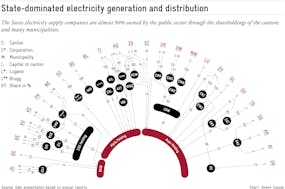Africa today has 1.2 billion inhabitants and its population keeps growing. Forecasts suggest that, in 30 years, the continent will be home to a predominantly young population of about 2.5 billion. Their relative youth helps explains why Africa has been dubbed the “continent of the future”.
But Africa’s 55 states (including Western Sahara) account for little more than 1 per cent of Switzerland’s foreign trade, or CHF 5.2 billion in 2017. Some CHF 1.8 billion took the form of imports into Switzerland, while CHF 3.4 billion comprised Swiss sales to the continent.
Compared with China, with a similar sized population, that’s pretty much peanuts. Swiss goods exports to China already account for 5 per of total exports and 7 per cent of total imports. And the figures just keep growing.
Trade relations are just starting
Switzerland’s main African trading partners in value terms are Egypt, Algeria, Morocco, Nigeria, South Africa and Tunisia. Switzerland has a free trade agreement with four: South Africa within the SACU (Southern African Customs Union, which includes Botswana, Lesotho, Namibia and Swaziland); and with Morocco, Tunisia and Egypt. Talks are under way with Algeria.

The African lion should not be underestimated. (Wikimedia Commons)
Since the agreements took force, the weight of Swiss trade with African nations has shifted towards the agreement partners. While Tunisia’s weight in trade in goods was around 2 per cent, for example, when the agreement was introduced in 2006, it had reached 5 per cent of Switzerland’s total goods exchanged with Africa by 2017. Algeria and Nigeria, by contrast, both saw their relative positions slip in the same period.
The apparent dynamism of trade with the free trade partners is, however, deceptive. Trade with Africa has grown at an average rate of only 1.5 per cent a year since 2000. Exports from Switzerland to Africa, which grew by an average 3 per cent a year, were the main contributor. Imports from Africa, by contrast, reported a negative annual growth of -0.6 per cent. But by way of comparison, Switzerland’s global trade in goods excluding Africa climbed almost twice as fast in the period, averaging 2.8 per cent annually.
Seen especially against Switzerland’s trade with China, the African results are very modest. Mutual trade with China soared by an average 20 per cent a year since 2000. Interestingly, in contrast to Switzerland, Chinese trade (and especially investment) with Africa have skyrocketed, with China now by far the continent’s most important economic partner.
A one-sided relationship
In most African countries, imports far exceed exports (see chart). That is due partly to Africa’s structural deficits: most African countries remain primarily commodity exporters, rather than climbing the value chain into manufacturing.
Take Arabica coffee, one of the best beans in the world. While big exporters, African growers play only a marginal role in processing. That shows in the trade figures with Switzerland. Some 26 per cent of imports from Africa comprise agricultural goods; 34 per cent are energy; and 15 per cent textiles and associated products.
That compares sharply with Swiss sales to Africa, more than half (52 per cent comprise pharmaceuticals and chemicals. Machine tools, equipment and electronics, and watches, jewelry and other precision instruments, make up 22 per cent and 10 per cent respectively.
Only limited intra-continental trade
Interdependence within the African continent is relatively low: intra-continental trade accounted for just 18 per cent of total exports in 2016. That contrasts with 69 per cent for Europe and 59% for Asia.
One reason why Africa’s intra-continental trade is still fairly minor could be because the continent lacks a real driving force to stimulate matters. There are not yet enough sales markets for the economically weak states and insufficient access to inputs, which is why they focus on trade outside their own continent.
Future potential
But things have started to move. This spring, the world’s largest free trade zone was established. The CFTA (Continental Free Trade Area) opens up new opportunities for Africa in intra-continental trade. To date, 44 African states have signed up. The deal could be decisive in kick-starting new trade structures and changing Africa’s role in world trade. The potential for Africa’s intra-continental trade is enormous, since unimpeded access to new markets will open the door to upgrading value chains – a prerequisite for benefiting more from world trade.
However, there is more than just reducing tariffs and liberalizing services to be done. Non-tariff barriers, like smooth and efficient customs clearance, must also be eliminated. Appropriate framework conditions are also needed for Africa’s transformation into an intra- and intercontinentally networked continent with a more diversified trade structure. Such conditions include cross-border investments in infrastructure to improve transport routes and greater harmonization of regulation and governance.
Corruption remains a big barrier. The Corruption Perception Index shows many African countries suffer severe corruption – a massive obstacle to trade. Corruption increases transaction costs, favors rent-seeking and leads to greater uncertainty and inefficient investment. Combating corruption is crucial for African growth in world trade.
Hidden opportunities for Switzerland
At first glance, China’s advance into Africa appears orchestrated by state owned enterprises. But in reality, 90 per cent of Chinese businesses in Africa are private. Rather than sheer money, a certain willingness to take risks seems to be the key factor. China’s economic transformation over the past 30 years has produced a generation of business leaders with not just experience of rapid change, but also of risk. The same cannot often be said of Swiss investors and entrepreneurs.
Switzerland should try to learn from the Chinese. With a greater presence in Africa, Swiss businesses could create jobs and support regional development. Once new value chains are established and trade structures adapted, deeper integration with Africa would be all the more mutually beneficial.





